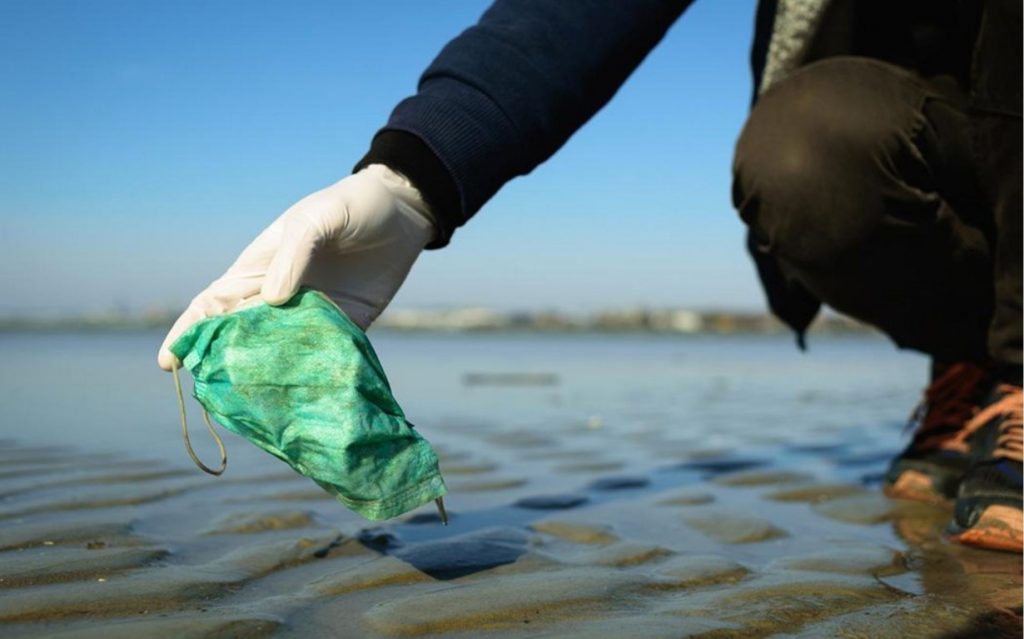Hospitals are generating 6 times more medical waste than usual, during the COVID-19 pandemic.
India, a country that never produced a single PPE achieved an unrealistic goal of manufacturing PPE daily after the outbreak of Corona.
In January, there were only 2.75 lakhs PPE kits available in the country, solely on the basis of imports. May 18, 2020 recorded the highest jump in domestic production of PPE kits with a number of 4.5 lakhs.
The global pandemic COVID-19 has led to millions of people getting admitted in hospital. And as the infection rate is high, it makes the use of PPE by health workers even more vital.
PPE includes use of single-use gloves, aprons and gowns, surgical masks, respirators and face protectors in the form of glasses, goggles or face shields.
PPE POLLUTION
Increased use of PPE by the healthcare industry has led to another completely unprecedented problem – the disposal of Personal Protective equipment (PPE). Given the pandemic induced situations, it is quite obvious that we need these PPE to keep ourselves safe.
But the question is ‘Are these PPE disposed properly?’
We’re witnessing these PPE littering our streets and beaches all across the world. This waste is piling up, creating an environmental crisis.
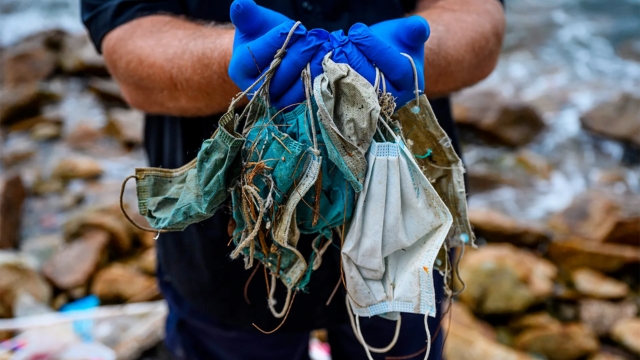
Medical-grade masks take around 500 years to degrade.
In a hospital environment, these items are regarded as waste. In fact, AIIMS, the premier healthcare facility of India is facing grave problems for disposal of these PPE since March. The problem with hospital waste PPE is that these can’t be used more than once as it possesses the risk of infections.
Only 70% of the medical waste like PPE kits are reaching the incinerator in India’s capital, New Delhi. Rest, 30% have been found dumped outside the hospitals, streets or even beaches.
For instance, floodwaters in Assam have spread discarded medical waste such as used PPE from hospitals and COVID Care Centres, raising fears of infection among people in inundated areas.
With the pandemic contributing to increased plastic use in healthcare, and large volumes of waste being unfit for recycling due to potential biohazards, medical plastic waste could grow at an unprecedented scale.
MANAGE PPE WASTE
- Incineration
Incineration, a process of waste burning at exceptionally high temperatures. Along with destroying viruses (as viruses cannot withstand high temperature), incinerators can reduce the amount of waste. The heat produced can further be used for producing electricity.
However, the use of incineration is controversial as the waste burned in an incinerator is usually fossil fuel derived like plastic which contributes to the harmful greenhouse gases.
- Plastivores
These are small organisms that consume plastic. Over 50 Species of such Plastivores have been discovered. According to Scientists at Brandon University, Canada, waxworm, the larval form of the greater wax moth, can digest plastic.
Mealworms can also feed on plastics including toxic chemicals like Styrofoam and show no-adverse or ill effects.
These Plastivores could be a solution to our plastic problems.
CIRCULAR ECONOMY
Circular Economy focuses on eliminating waste through the reuse of resources.
A model of production and consumption that involves reuse, reduce, recycle, re-manufacture of a material as long as possible.
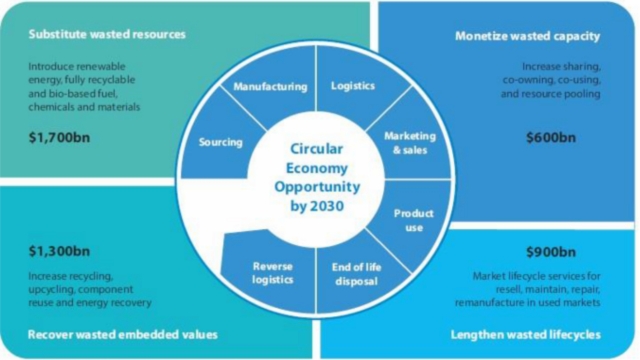
CIRCULAR ECONOMY INITIATIVES
Various initiatives taken by companies promoting circular economy
- IITR Lucknow in India with a startup named ‘Major Technology’ has developed a sanitizer machine that can sanitize N95 masks and PPE kits and can make it reusable for at least 20 times.
- Stericycle in the USA offers simple and safe solutions to dispose of medical waste like Personal Protection Equipment. It also provides environment regulated waste management services.
- JWSWaste in the UK offers collection, disposal and recycling of COVID-19 PPE waste.
- Closed Loop Recycling in the USA offers cleaning solutions of PPE to its customers. They have an extensive laundry system that covers almost all types of PPE.
- Battelle Critical Care Decontamination System, which can decontaminate thousands of N95 respirators at a time through a process that uses concentrated, vapor-phase hydrogen peroxide.
CIRCULAR ECONOMY SOLUTIONS
To combat these disposal issues, a different approach towards circular economy is required.
- Administrations around the world should allocate more funds to educate people and spread awareness about recycling, reducing, and reusing waste material.
- Consumers must be made aware to be provided with a sense of responsibility to segregate the waste at home.
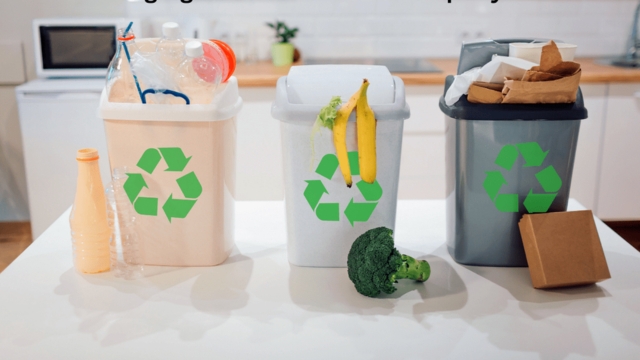
- Encouraging the production of polymers with improved recyclable qualities that would make it easier to reinsert used plastics back into our economy.
- During the pandemic, polymers began to be perceived as a valuable material for the production of medical personal protective equipment. This highlights how corporations can play an important role in delivering safety along with decreasing pollution.
- Reusable PPE kits could be introduced in place of single use PPE kits. For instance, Vadodara’s Sure Safety Limited company has developed India’s first reusable PPE. Considering the risk of infection, what differentiates this reusable PPE from Single use PPE is the raw material like multi-laminated fibres.
The best way to start is to acknowledge that there is no easy solution to the problem. The development of effective measures against plastic pollution is a complex and long-term process that will require a systems-level approach from companies and administrations on a global scale.
Sustainability will only be achieved by prioritizing our actions and policies together for the greatest long-term environmental and economic good.
Earth5R Initiatives
Earth5R has been actively engaged in practicing and promoting a circular economy. We have trained and engaged citizens of all age groups and socio-economic backgrounds to encourage them to take steps towards creating a sustainable society.
One such Awareness Programme on Plastic pollution was conducted by the team of Earth5R, in Banglore:
- The kids were taught about the right disposal methods of plastic and its relevant importance with respect to the environment.
- Apart from that, they were also informed about the nearby dry waste collection centers and the important role of such centers.
- The activity concluded with a promise from the kids’ end, they promised to not use plastic bottles for a longer duration and to dispose such waste in a segregated manner from the regular waste
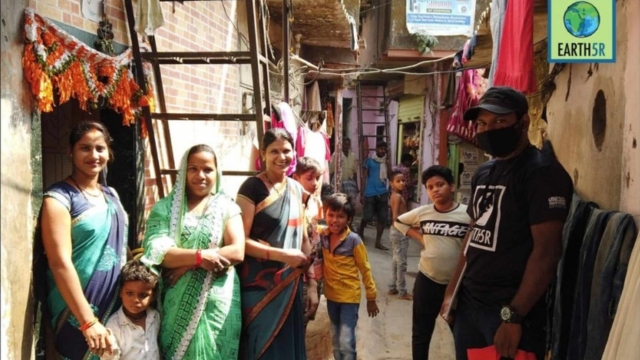
About Earth5R
Earth5R is an environmental organization from India with its head office at Mumbai. It works with the NGO sector, Companies and helps them conduct environmental corporate social responsibility (CSR) programs across India. Earth5R specializes in circular economy based projects. Earth5R also offers short term and long term environmental courses.
Earth5R is conducting large-scale online training on COVID 19 Coronavirus prevention, response, management, and self-sustainability. These training are conducted on digital platforms in regional languages across India and other countries.
Earth5R’s Global Sustainability Hub is a cross-sector and cross-country collaboration in pursuit of UN Sustainable Development Goals. It is an excellent opportunity for governments and the private sector to engage with communities, use Sustainability-based models to drive economic changes, and create social and environmental impact.
Reported by Harsha Nath, Edited by Aastha Dewan

